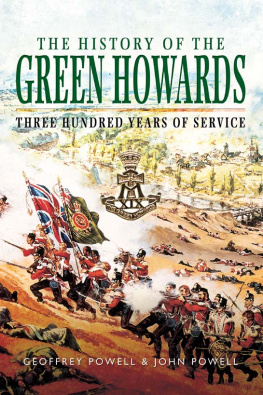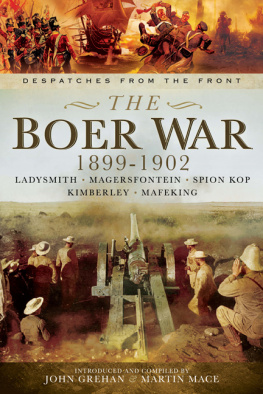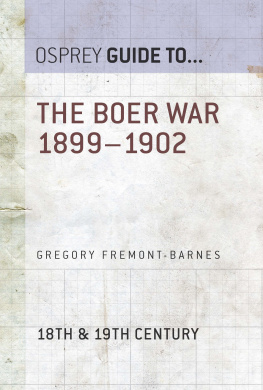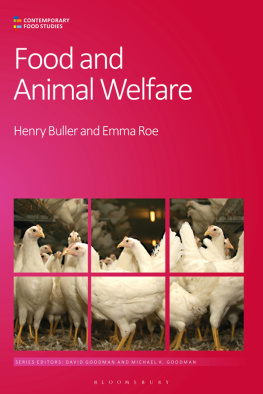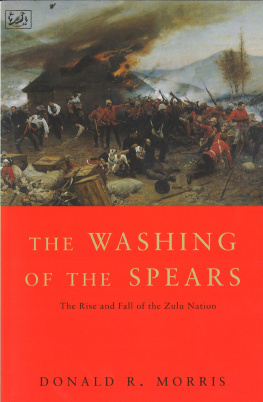Thomas Pakenhams monumental The Great Boer War did much to stimulate me to write this book. After reading what will surely remain the definitive history of that unfortunate conflict, it became clear that Redvers Buller was a person even more intriguing than I had previously supposed. Maligned for near on a century as the epitome of Victorian military ineptness, Pakenham revealed that behind a caricatured faade lay an able and thoughtful soldier, one who had, as a French observer of the War judged, been given its toughest job; moreover, he evolved the tactics needed to overcome Boer defences based upon fortified entrenchments and the recently introduced quick-firing weapons using smokeless missiles. Remembered as a battlefield soldier, he was to be held in respect and affection by the Royal Army Service Corps and its successor, the Royal Corps of Transport, as an able and imaginative administrator who, in founding their Corps, first placed the supply and transport services of the Army upon a sound footing. As Sir John Fortescue, the British Armys first comprehensive historian, recorded between the two World Wars:
I have weighed my words carefully before I say that Redvers Buller, who made the Army Service Corps, wrought not less towards the winning of the late War than Herbert, Lord Kitchener, himself.
Soon after reading Thomas Pakenhams fine book, I came upon Professor Robin Highams A Guide to the Sources of British Military History in which it was claimed of Buller that this enigmatic man needs further assessment. As I found out more about him, I decided that Buller was not so much enigmatic as a mass of contradictions, an individual who revealed widely varied facets of his characters to colleagues and to subordinates, to his soldiers and to his enemies, to artistic friends and to fellow squires, to cabinet ministers and to reporters.
Four previous biographers had tilled the ground before me. Writing soon after Bullers death, Major Lewis Butler, who knew him slightly and was a member and historian of his Regiment, in a brief book tells us much about his subjects early service. This was followed by Walter Jerrolds popular Sir Redvers Buller, VC, published just before the First World War. At the time of his death, however, his widow had asked Fortescue, who knew him well, to write his official biography; this he declined, pointing out that it was still too early to tell the whole truth about one he described as the greatest man I ever met
In Fortescues place, Bullers daughter asked Colonel C. H. Melville to undertake the task and his two volumes appeared in 1923. With many of Bullers contemporaries still alive, it was still too early to tell the whole truth; furthermore and in accordance with the wishes of his subjects wife and daughter, Melville was determined that the book would not contain any controversial matter which might lead to correspondence in the press. But to leave such gaps so worried him that he wrote explanatory notes to each volume in which he expanded upon some of these controversial subjects. These notes lay hidden in his familys possession until recently and have helped me to elucidate several points upon which, as Melville wrote:
though I was morally certain, actual proof was, and is, impossible to obtain. These I have drawn attention to in these notes, as well as certain opinions of my own, which would certainly have led to unnecessary controversy.
The fourth book I referred to is Bullers Campaign by the distinguished historian Julian Symons and published three decades ago. It deals only with Bullers relief of Ladysmith and is discussed later. In addition, Sir Edmund Gosse, poet and man of letters, contributed an essay in 1900 for The North American Review, possibly over eulogistic but informative about an eminent member of the artistic communitys attitude towards Buller.
The amount of archival source material available to me was to prove daunting. Some of it had already appeared in printed form, especially in the Letters of Queen Victoria and in various biographical works about Lord Wolseley, Lord Roberts, General Sir Ian Hamilton, Lord Milner, Mr Campbell-Bannerman and others. Whenever possible I have checked the published material against the original papers, but unless the differences have been important I have usually used the published extract. However, access to the papers of the 5th Marquess of Lansdowne proved difficult to obtain; consequently quotations are in all cases from secondary sources.
Despite the large quantities of Bullers own papers either in the familys possession, at the Devon Record Office or in the Public Record Office, many of the letters quoted by Melville, especially those written to his wife, have sadly proved elusive. It seems certain that they have either been destroyed or lost.
I must pay a special tribute to Mrs Rosemary Parker, Redver Bullers great-niece and the present owner of the family papers and of Downes, the Buller family home, for the encouragement and help she has given me over a period of almost four years, not least for lending for a considerable period large quantities of valuable documents, including the notebooks of both Bullers daughter and sister, Henrietta. Mrs Parker and her husband, Major Peter Parker, were also kind enough to entertain me at Downes. Needless to say she imposed no restrictions on what I have written; I asked her to read in draft only that part which covers family matters.
Thomas Pakenhams The Boer War gave me what I hope was a proper understanding of its background and progress. The author also provided much encouragement and devoted a great deal of his valuable time to discussing my project and answering my questions.
I acknowledge the gracious permission of Her Majesty the Queen for allowing me to use material from the Royal Archives, and I warmly thank Lady de Bellaigue, the Registrar, for her help and advice when I was working at Windsor.
My thanks are also due again to Mrs Parker, and to the Bodleian Library, the Devon Record Office, the Gloucestershire Record Office, the Trustees of the Liddell Hart Centre for Military Archives, the National Army Museum, the Public Record Office and the Royal Corps of Transport Museum for allowing me to quote from manuscript material in their possession. I must also acknowledge the usual unstinting help I received from their librarians and archivists, and also from those of Queens University, Kingston, Ontario, the Department of National Education of South Africa, the London Library, the Royal Albert Memorial Museum and Art Gallery, Exeter, the Royal Commission on Historical Manuscripts, the Royal Greenjacket Museum, the Royal Military Academy Sandhurst, the Royal United Services Institute for Defence Studies, the Sherwood Foresters Museum, the Staff College Camberley, and, last but in no way least, the librarian of my small local branch of the Gloucestershire Library, Mrs Pat Thompson.



